#Cyborg Theory
Explore tagged Tumblr posts
Text
The Philosophy of Artificiality
The Philosophy of Artificiality explores the nature, meaning, and implications of that which is man-made or synthetically constructed, as opposed to what is considered natural or organic. It raises deep ontological, epistemological, aesthetic, and ethical questions about the human relationship with reality, technology, creativity, and authenticity.
Core Questions
What is "artificial"? At its core, artificiality refers to things made or altered by human design rather than arising spontaneously in nature. But philosophically, this distinction can be blurry. Are artificial things less real or authentic?
How do we value the artificial? Some traditions view artificial constructs as lesser than natural ones (e.g. artificial beauty vs. natural beauty), while others celebrate human ingenuity and artificial enhancement (e.g. transhumanism).
Is artificiality opposed to authenticity? Existentialist and phenomenological traditions often associate authenticity with being true to one’s nature, while artificiality may be seen as performative or contrived. Yet, some argue artificiality is intrinsic to human culture.
Does artificiality distort or reveal reality? In postmodern philosophy, simulations and hyperreality (e.g. Baudrillard’s Simulacra and Simulation) suggest that artificial constructions can overtake or replace the real, raising questions about what’s “true” or “genuine.”
Related Philosophical Themes
Techné vs. Physis: The ancient Greek distinction between art/craft (techné) and nature (physis) is central. Artificiality is linked to techné—the human capacity to shape the world through skill and artifice.
Artificial Intelligence & Ethics: As we create entities capable of learning and decision-making, questions about consciousness, moral responsibility, and personhood arise. What ethical status does a synthetic mind have?
Artificial Environments: Architecture, virtual reality, and synthetic biology all raise ontological questions—what kind of reality do they create, and how do they shape human experience?
Aesthetics of Artificiality: In art and design, artificiality can be embraced (e.g. surrealism, modernism), or critiqued for creating inauthentic experiences. This challenges traditional aesthetic values.
Human Identity: Are humans themselves artificial beings in some sense—culturally, psychologically, or technologically constructed? From social roles to prosthetics, artificiality becomes a way of defining identity.
Philosophers and Thinkers
Martin Heidegger: His critique of technology as enframing offers a caution against reducing the world to resources.
Jean Baudrillard: Explored the dominance of simulations and the loss of the "real."
Bruno Latour: Argued against strict separations between nature and society in science and technology studies.
Donna Haraway: In “A Cyborg Manifesto,” she embraces hybridity and artificiality as liberatory.
Plato: In The Republic, he warned that artifice (e.g. shadows on the cave wall) can deceive us into mistaking imitation for truth.
Conclusion
The philosophy of artificiality challenges us to reconsider the boundaries between natural and constructed, real and simulated, authentic and artificial. It is a vital area of thought in an age where synthetic realities—digital, cultural, and biological—are increasingly dominant.
#philosophy#epistemology#knowledge#learning#education#chatgpt#Philosophy of Technology#Ontology#Authenticity vs. Artificiality#Human-Made vs. Natural#Aesthetics#Artificial Intelligence#Postmodern Philosophy#Baudrillard#Techné and Physis#Simulation and Hyperreality#Ethics of Artificiality#Virtual Reality#Cyborg Theory#Heidegger#Artificial Consciousness
4 notes
·
View notes
Text
I never got a smartphone, and some days are rough. I can't use a lot of apps that are only available through smartphones, I can't do some convenient things. and I keep misplacing my dumb phone when I need to do phone verification for a few things. I definitely feel like a cranky old anti-tech person, which is ironic since I have a background in technology theory and ethics (so I know what it does to me). I'm also so scared that such a device can be so easily stolen, hacked, or otherwise compromised, and I would not be able to live with that level of stress constantly. I knew it would suck my attention and soul away like nothing else. And I still manage to spend too much time online thanks to wifi. So I've been actively limiting how I access social media, and it's helped my brain so much. The cyborging / extended mind is super easy to slip into (see: Andy Clark and extended mind theory). And there are some great things that come of this phenomenon, but it's also insidious when the end result is about distraction, hypersocializing, and never giving our brains time to rest. (Also see: The Anxious Generation by Jonathan Haidt) Between the data/privacy issues and how it's rewiring your brain, it's a really good idea to try to do a reset and reflect on what you are using your smartphone for and make deliberate choices about how you use it going forward.
I know millennials are getting the traditional generational luddite reputation at this point for sneering at smart devices and banging on about privacy and not needing all those fancy functions etc. but I am speaking to you right now as an experienced activist: you have to start seeing your smartphone as your big red glowing weak point. it is a repository of all the information someone could conceivably use to ruin your life, and you carry it around with you all day every day guarded by maybe a 6 digit PIN (or a photo of your face, seriously turn off face unlock right fucking now).
#technology#tech use#smartphones#privacy#data#smartphones and data#technology theory#cyborg theory#extended mind#andy clark#the anxious generation#jonathan haidt#activism#effective activism#social media#deliberate technology usage#cognition
14K notes
·
View notes
Text


Bc of that one official art of Mizisua like this (I based this on that) I'm starting to think that Sua like, might not actually be fully human since the beginning? Anyways, I finally have a stylus pen😌
#i need someone to prove my theory pls 😭 it would be so cool#artists on tumblr#my art#lesbian#fan art#alien stage#art#fanart#alien stage sua#alnst#alsnt sua#mizisua#suamizi#mizi alnst#mizi alien stage#alien stage mizi#alnst mizi#mizi#mizi fanart#sua alien stage#alnst sua#sua alsnt#sua art#sua alnst#cyborg#gay
430 notes
·
View notes
Text
Ranking different One Piece family theories on a scale from 1 (let’s be sooo forreal rn) to 10 (written in the stars and in Oda's notes) Part 1/??
Disclaimer: just because I give a high ranking on a theory doesn’t mean I like it on a personal level and vice versa. I am trying to be objective about the possibility of these theories becoming canon (I will probably fail).
———————————————————————
Dragon's real father is Rocks D Xebec and he married into the Monkey Family via Garp's daughter: big BIG fan of making things up but like cmon…there’s no need to call Maury Garp is definitely the father. 0.5/10
Shanks is Coby's father: probably not canon but god I wish it was it would hilarious!! I support these kinds of delusions 🙂↕️🙂↕️! 1/10
Strussen is Persopero's father: absolutely horrific implications given the fact he knew Big Mom when she was 6 (?) and he was a grown ass man. My least favourite part about this theory is that it actually could be true. 7.5/10
Queen is Franky's father: boooooo hisssssss why would Oda do this to Franky nation?!?! Unfortunately probably canon. 9.5/10
Yamato is Big Mom and Kaido's kid: I feel like this would have been talked about?? Or at the very least Big Mom would have snatched Yams up and had him live with her right?? 3/10
Kong is Garp's father/a member of the Monkey D Family: yeah it lines up a little too much. He’s got the same features, the scar around eye, his name is KONG. What else do I gotta say? 8/10
Crocodile is Luffy's other parent: there’s not a lot of evidence behind this one but there’s so much belief and I gotta respect that. 6.5/10 (it’s a 10/10 in my heartttt).
Rocks D Xebec is Blackbeard's father: I mean…yeah that would make sense but it’s also kinda boring sorry 😭😭. Would be very meh if this becomes true. 8/10
———————————————————————
#if y’all have any crazy OP family theories lemme know!!#<- omg I sound like a YouTuber 😭😭#one piece#one piece theory#one piece thoughts#rocks d xebec#monkey d dragon#monkey d Garp#akagami no shanks#koby one piece#big mom one piece#charlotte perospero#one piece strussen#queen one piece#cyborg franky#yamato one piece#kaido one piece#kong one piece#sir crocodile#monkey d Luffy#blackbeard one piece
78 notes
·
View notes
Text




#personal#dsmp#dreamlessart#awesamdude#c!sam#c!tommy#c!hannah#c!boomer#not my usual lineart style but was fun#boomer’s design in this is a placeholder#I’ve literally never drawn him before#but I always felt like his character had so much potential in Sam’s story#especially with the clone Sam ending#Sam clones are so underutilized#been thinking about it a lot lately#current running theory is that the clones are technically cyborgs#a mix of asexually reproducing and therefore identical creepers as the organic base#with intense redstone engineering#EDIT#I rewatched the Sam and Phil finale#I always forget how bs the canon worldbuilding is
97 notes
·
View notes
Text
hey so like have yall noticed how movie robotnik is looking more and more like game eggman as the series goes on? like in 1 he didn't look much like eggman minus the outfit at the end, then in two he gains the mustache, and in three he gains weight and his outfit looks more like the games. watch him come back in 4 being fully cgi and just game eggman lol
#WAIT THEORY ALERT#IN MOVIE 4 AFTER THE EXPLOSION WHAT IF HE TURNS HIMSELF INTO A CYBORG THAT LOOKS LIKE GAME EGGMAN?#does that count as a theory i feel like theres another word i should be using here#prediction? no#also if this is like a widely known thing everyone knows and ive just never noticed whoops#dr robotnik#eggman#sonic movie#sonic movie 1#sonic movie 2#sonic movie 3#sonic movie 4
8 notes
·
View notes
Text
Franky: I am not a crybaby.
Robin: Toy Story 3?
Franky: The toys were holding hands in a furnace!
#one piece#cyborg franky#nico robin#frobin#The Big Bang Theory#the proton transmogrification#toy story 3#incorrect quotes
78 notes
·
View notes
Text
mawa cyborg Superman theory
Since seeing the picture of season 3 of maws:

I haven't thought about it a lot but I have thought about what could possibly happen in season 3 specifically with this guy

Hank henshaw aka cyborg Superman. I don't read comics but I do watch TV shows and movies that's how I know about Hank's role as cyborg Superman. I think that the l on his chest means that lex Luthor with probably have a hand in saving Hank, even if it does turn him into a cyborg. After becoming cyborg Superman and if something where to happen to the real Superman Hank would step in and assume the role of Superman and metropolis's Superman. Following one of the movies I've seen Hank, knowing about Lois's and Superman's relationship Hank would try to convince Lois he's the real Superman and try to use her to boost his public image. When this fail Hank then uses force to sway Lois into boosting his image and even go as far as to forcibly try to get Lois to love him thinking he's doing her a favor by being in love with someone for earth a "real man."
This is what I think with happen with Hank when Maws season 3 comes out.
17 notes
·
View notes
Text
Writing Disability: Let us Love like everyone else
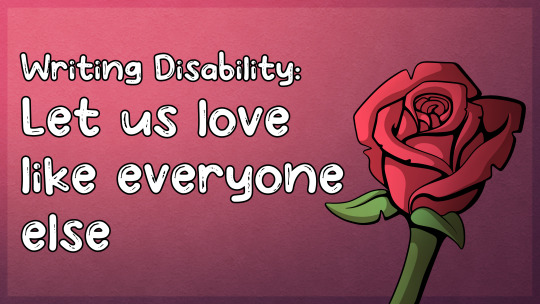
[ID: An illustrated picture of a red rose on a pink background. To the left of the rose is white text that reads "Writing Disability: Let us Love like everyone else. /End ID]
Romance is one of the top-selling genres in the world across mediums, and pretty much every movie, TV show, book and game has at least one romance sub-plot. You don’t need to look far to find it. However, when it comes to disabled characters, a lot of creators shy away from giving us romantic plot lines or even hesitate to address the topic of disability and attraction being present in the same character at all. So, since it’s Valentine’s day, I thought now would be the perfect time to discuss it.
It can be easy to miss if you aren't paying attention, but a surprising number of stories in various mediums will pair up most if not all of their main cast of characters by the end of the plot… with the exception of the disabled characters. whether they be explicitly stated to be disabled or just coded as such, disabled characters are more frequently left out of relationships by the story's end. Sometimes, the disabled character will be completely disinterested or the subject is just never addressed, such as with Toph from Avatar the Last Airbender. Toph is implied to have had multiple relationships by the time of the sequel series, but unlike the rest of the original gang, we never see it on screen, so I personally think it doesn't count for reasons I'll get into in a moment. Alternatively, the disabled character will show interest in someone, but their affection is just not reciprocated, such as in Disney’s Hunchback of Notre Dame. Disney's Hunchback is a particularly noteworthy example since it's one of the only theatrical Disney movies where the main character has a clearly stated love interest, but doesn't end up with them by the end.
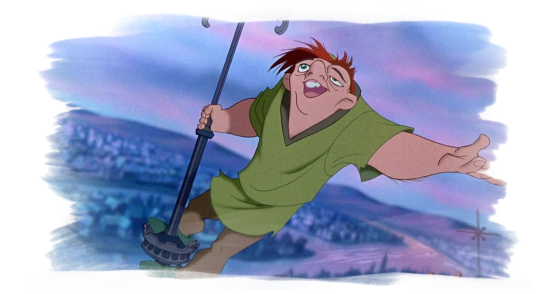
ID: an screenshot of the hunchback of notre dame showing Quasiemodo, a man with a hunchback and facial differences swinging and singing on at spire at the top of the notre dame cathedral. /End ID
In the latter case, where the disabled character’s love is not reciprocated, these stories will often focus on the importance of self-discovery and self-love. An important message to be sure, but the fact that these “you don’t need a partner as long as you love yourself” stories very often centre disabled characters is frustrating, to say the least (If the character isn’t disabled, they’re often deemed “undesirable" for other reasons, such as being fat, but that’s a topic for another day).
Of course, the reason the character doesn’t end up with their love interest doesn't have to be because of their disability specifically. Even if they were turned down for other reasons, it can still contribute to the stereotype that disabled people can’t find love even when they want to, just aren’t desirable as partners (a sentiment that is especially commonly directed at visibly disabled people) and contributes to the overall lack of representation of disabled relationships.
In the other case I mentioned before, where a disabled character is just not interested in romance, can look different depending on the kind of disability the character has, but in my experience, it often comes from the same place: discomfort. This isn't necessarily a conscious thought or decision on the creator’s end, mind you, but just because it's not intentional, doesn't mean it's not doing harm, even if it’s subconsciously.
A lot of the time, many creators don't even consider giving their disabled characters a love interest. the thought never even occurs to them. I can't pretend to know why for sure, but if I had to take a guess, its because the idea of disability and romance just don't go together in most people's eyes, so the thought never even crosses these creator's minds. But why? it comes back to that discomfort.
When we are talking about physical disabilities and those effecting the body but not the brain, the discomfort can come from a few places. First is the discomfort with disabled and visibly different bodies and how they work as a whole. I've spoken about this in the past, but just the idea of disability alone often makes non-disabled people deeply uncomfortable, and when it comes to visible disabilities, they are often forced to confront that, something that a lot of people are resistant to. they don't like thinking about it, and while many non-disabled creators have dealt with this discomfort enough to include us in their stories, they haven't deconstructed it enough to include us having things like romantic relationships.
This is why, despite the fact that Toph has children in The Legend of Korra, I’m still using her as an example. We see the other main character’s relationships and partners in the original show and in The Legend of Korra directly, but never hers. The most we ever hear of Toph’s love life is that Sue and Lin, her daughters, have different fathers. While the mention was good, when looking at this through the lens of “people are uncomfortable with disabled people being in relationships” you can see how the openly disabled character’s relationships only ever happening off screen and occasionally mentioned might still be an issue, even if that wasn’t the creator’s intent.
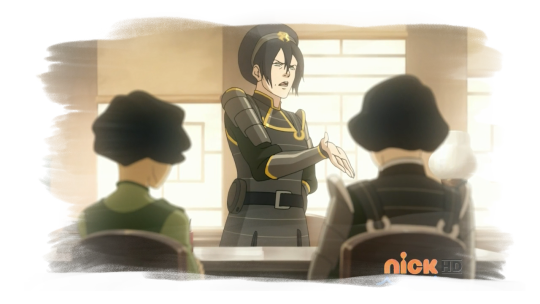
ID: A screenshot of the legend of Korra showing Toph, a middle-aged woman with black hair and metal armour, lecturing her two daughters. /End ID
this disparity becomes particularly noticeable, however, in media aimed at an older audience where romantic relationships often mean sex. When the relationship is expected to be sexual in nature, an extra layer of discomfort often appears. A lot of people just quite simply don't understand how sex works when you have a physical disability, and are extremely uncomfortable simply looking it up (there are educational resources out there on the subject, and even disability content creators who focus on educating people about sex and disability, I’m not talking about looking up porn). Often times, they just avoid it by simply not giving their disabled characters relationships of any kind to avoid having to address those questions.
There is also the fact that many people infantilise those with disabilities and associate us with children. This is more common when it comes to non-physical disabilities, such as those under the neurodivergent umbrella (which refers to any disability that primarily impacts the brain) and I'll talk about that in a moment, but it does happen with physical disabilities too, most notably with little people and disabilities that impact someone’s height or physical development. Often, for those of us with physical disabilities, the infantilization comes from people either directly associating us with children because of our appearance, or feeling as though we need to be protected like children.
When talking about disabled people in relationships, this might look like someone being hesitant to pair a disabled character up with someone without a disability because they “can’t protect themselves” if the relationship goes bad. This isn’t something I’ve seen stated directly much in media, mind you, but it is a response I’ve gotten from a surprising number of people in real life when I’ve asked why they don’t like the idea of “people like me” (meaning amputees and wheelchair users) dating. I wouldn’t be surprised if it’s the reason some authors and creatives avoid inter-abled relationships in their works based on how often I got that comment when I started dating; they are concerned about the power imbalance. but this mindset is based on both infantilization and the stereotype that physically disabled people are always inherently weaker. If you’re not always worried about how non-disabled characters would protect themselves in a relationship, why are you only worried it when one of the characters is disabled?
However, like I mentioned before, the disabled character being simply uninterested in romance or sex isn't unique to visibly and physically disabled people. It’s is so common with neurodivergent folks, in fact that it’s become a bunch of tropes all of their own, with the most common variant being where specifically autistic or autistic-coded characters will often be the only aromatic or asexual people in a story’s cast.
For those unfamiliar with the terms, aromatic people are those who experience little to no romantic attraction, or those who experience it differently to most, while asexual people are those who experience little to no sexual attraction (or, again, experience it differently to most). It’s a bit more complex than that, and both terms exist on a spectrum, but in order not to get too side-tracked, I’ll leave it there. I‘d highly, highly recommend Jaiden Animation’s video on the subject though if you want to learn more in a beginner-friendly way.
There’s this idea that a lot of non-disabled people get about neurodivergent folks, especially those with developmental or intellectual disabilities, that we are these sweet little innocent beans who don’t want to or simply can’t engage with “adult” things. In most cases though, this isn’t the true. For some folks, including many creators, this is once again an unconscious bias and is the result of them simply not thinking about or deconstructing their ideas around different kinds of disabilities. In these cases, the idea usually stems from the fact that there are some (keyword some) disabilities under this category that do impact someone’s ability to engage with things like sex and romantic relationships, and most people not overly familiar with the disability community just don’t know enough to understand that just because some people under this category can’t or don’t want to engage, doesn’t mean we all can’t.
Unfortunately though, when this is pointed out to a lot of people, instead of adjusting their viewpoint or seeking more information, they get severally uncomfortable about the idea, even going so far as calling someone who is dating someone with a developmental or intellectual disability as “creepy” because they, once again, associate people with these kinds of disabilities with children. Since children can’t consent, neither can we. This is, once again, infantilization, but much more directly.
While I haven’t seen the full episode (or much of the show as a whole), so I don’t really want to comment on weather it handled the subject well, I do at least appreciate that the show Glee calls this line of thinking out when one of the characters, Becky, who has down’s syndrome, begins dating someone without a disability. The parts of the episode I have seen shows several characters around Becky expressing concern, but their bias is called out by the end of the episode. What I have seen of Glee was during a particularly long stay in hospital while being given pretty strong medication so my memory of it is spotty (not to mention everything was out of order) so like I said, I can’t comment on weather or not it was good per say, but I do remember the discussion this episode sparked in my high school with students and teachers alike, and I remember it being the starting point for some important conversations with people.
As I said, there are some disabilities under the neurodivergent umbrella that might prevent a character from engaging in a romantic or sexual relationship. some. however, it's incredibly important to remember that a lot of these kinds of disabilities exist on a spectrum of support needs, and if the character in question's disability would be preventing them from doing so, they would typically be on the very severe ends of those spectrums and have very substantial support needs in other areas of life too. The vast majority of neurodivergent characters in media don't fall into this category. If you are writing someone who has these higher support needs (and please do, we need more characters like that!), be sure to do your research and double check your assumptions about their capability to engage though. Ensure it's actually reflective of their disability and isn't just based on stereotypes and misinformation. And don't forget, if you’re ever unsure, you can always check with a sensitivity reader or disability consultant.
Even in cases where a disabled character does get into a relationship, one of a few things frequently happen that I think authors might want to be mindful to avoid - or at least approach with caution.
The first is that the disabled character, despite being in a relationship, will be completely disinterested in sex (or any part of a physical relationship, such as kissing, if the content is aimed at a younger audience), often being implied or directly stated to be asexual. The first example of this that springs to mind for me is Sheldon Cooper from the Big Bang Theory. While Sheldon is never confirmed as autistic within the show, he displays many autistic traits throughout both the original show (albeit in a stereotypical way that’s played mostly for laughs) and in the spin-off, Young Sheldon. When Sheldon does eventually get into a relationship though and even gets married, he is shown to be very, very reluctant and overall disinterested in sex.
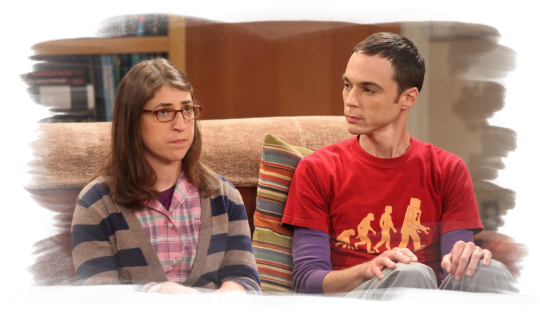
ID: A screenshot from Big Bang Theory of Amy and Sheldon sitting on a couch, where Amy looks annoyed towards someone off camera, while sheldon looks at her, confused. /End ID
So what’s the problem with this? in a vacuum, nothing. Some people don’t care for sex and don’t experience sexual attraction, and it’s fine to show that - we need more ace representation! I myself am disabled (an amputee and autistic) and asexual, shouldn’t I be glad to see characters like me?
Well, the issue isn’t that this is unrealistic, but rather overplayed and often contains a lot of misinformation about both asexual people and disabled folks.
My disabilities have nothing to do with my asexuality - which remember just means someone doesn’t experience sexual attraction; it has nothing to do with weather or not someone enjoys sex. However whenever asexuality and disability are paired together in the same character, it’s almost always because of the character’s disability. As in, the person in the wheelchair is ace because they can’t feel anything down there so they stopped feeling attracted to people (which is not even close to how that works, but is a real example I’ve seen on a few occasions now) or the autistic person is just too invested in telling you about trains, science, superhero’s or whatever their special interest is, to be worried about sex.
The other issue is, like I said, there’s a lot of examples of disabled ace characters already, and considering how poorly most are handled, many disabled people and asexual people alike are just tired of seeing it. Honestly, until both disability and ace representation and understanding as a whole, improve independently, it’s a combination of identities I’d recommend avoiding in your work, at least for now.
Finally, when a disabled character does enter a relationship, sexual or not, a very common dynamic is that the character will often get very insecure and scared that the person they’re dating doesn’t actually like them, or worries that the other person is settling for them, often resulting in their partner reassuring them that they love them, "despite their disability." A recent example of this can be seen in the web series Helluva boss between the character Fizzarolli, an imp who is a quadrilateral amputee with broken horns and facial scarring, and his boyfriend Asmodeus. While Fizzarolli’s insecurities are primarily focused on living up to impossible standards for success, he shouts during a panic attack that he believes that Asmodeus will leave him if he isn't successful, stating that without it, "this is who I am" - ripping off his hat to show his broken horns and scars (something we are told that he acquired in the same accident he lost his limbs in).
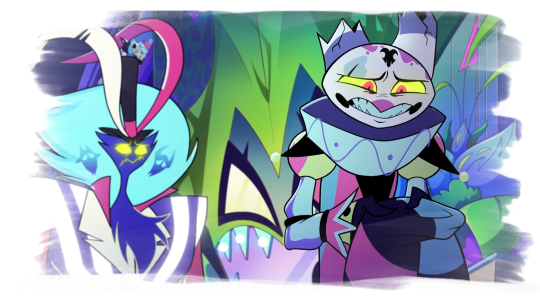
ID: A screenshot of Helluva Boss showing Fizzarolli, a cartoon imp in a clown outfit, patchy makeup and broken horns, anxiously holding his jester's cap in his hands. Behind him, Asmodeus, a large blue, feathery demon in a striped suit, looks on, concerned. /End ID
My problem with scenarios like these is once again, not that it’s unrealistic, but that it shows up constantly. The intention with these kinds of scenes is often to assure the character and by extension, disabled readers or viewers, that they are in fact deserving of love. That just because they’re disabled, doesn’t mean they’ll never find anyone. Once again, it's a good message, however, because of how prevalent this exact scene is, it can actually have the opposite effect.
Let’s step back from disability for a moment: If you see dozens and dozens of people with a feature you have, saying they are insecure about that same feature in almost all of of the shows you watch, the books you read, the games you play where characters with this feature appear, even if you aren’t insecure about it yourself, seeing over and over again that others are, it’s natural that it would start to make you doubt or wonder if you should be. Doubly so if that very insecurity prompts these big, often explosive and emotional scenes.
This was the case for me as a kid, I never really cared much about my disability outside of being annoyed that people stared at me, but as I got older, and I saw more and more characters in the media I consumed saying they were certain no one could love someone like them - someone like me - I became more and more worried. The messages that were supposed to be reassurances, instead told me over and over that the people these characters ”found” were the exception, not the rule, and that most people would, in fact, care that I was disabled and not want to date me. When all my friends began dating and getting into relationships, I began to worry that I would never find “my exception to the rule” and be alone forever.
I didn’t really get over that mindset until well into my 20’s, well into my current relationship with my now fiancé, and I know I wasn’t alone in these concerns. I used to work with teenage amputees, and this was a very, very common fear across all genders and sexualities. I still see it in forums and social media groups whenever newly disabled people join, it’s one of the more common fears brought up, and while I get that scenes like these are meant to reflect this reality and help, more often than not, they’re doing the opposite.
For once, I would love to see a disabled character get into a relationship, and for there not to be any mention of “are you sure?” “How could you ever love someone like me?” “I’m worried you don’t actually find me attractive” etc. These conversations are realistic, yes, but we see them so often that I just really wish I could see more examples of stories where the validity of the disabled character’s relationship is never questioned and is never a concern. It just is.
Of course, as with most of the subjects I’ve talked about before, many of these points are less of a concern if you have multiple disabled characters. If you only have one disabled character and have their love interest reject them, it can perpetuate these stereotypes about disabled people being unable to find love, but if you have another character who is successful in that reguard? Well, it’s much less of a concern. The same goes for if one of your disabled characters is asexual or aromantic, but there’s another disabled character who isn’t, or if one disabled character is insecure about their disability in their relationship, but another isn’t.
Of course, be mindful not to go too far in the other direction either. A lot of people are pretty shocked to learn that disability fetishization is also a thing, and while you shouldn’t shy away from showing disabled characters in sexual relationships just because they’re disabled, it is something you need to be mindful of if your story contains more explicit content. As a general rule of thumb, sowing your disabled characters engaging in the same kinds of relationships, romantic and sexual (including casual hook-ups and one-night-stands) is great, so long as it a) fits the character and the story, and b) is actually inline with how you’re treating those topics with the non-disabled characters.
Personally, I don’t really feel like I’m the best person to advise on where exactly that line between just showing disabled people in sexual relationships/situations and fetishisation is, though the general advice I’ve heard is to ask yourself if the focus is on the disability, or if the person just happens to be disabled. On that same note, I’m also not really comfortable explaining details of how sex works when you’re disabled. If you want to know about either of these topics, there are a plethora of disability content creators who focus specifically on those subjects.
To sum this all up though, disabled adults are, well, adults, so don’t be afraid to treat us as such. Show us in relationships where the non-disabled partner’s affection isn’t a matter of debate or insecurity, show us being intimate and having sex (if that’s something you were doing with your non-disabled characters), let us be confident in those relationships, the same as everyone else, and most importantly, remember that a disability doesn’t automatically mean someone just won’t be interested in us, or we won’t be interested in them.
#With the exception of big bang theory I love all the content i used as examples - no hate meant#Writing disability with Cy Cyborg#Writing Disability#Long Post#Disability#Disabled#Disability Representation#Writing#Writeblr#Authors#Creators#Writing Advice#Disabled Characters#On Writing#Disability in Media#Big Bang Theory#Avatar the Last Airbender#ATLA#Legend of Korra#LoK#Helluva Boss#romance#valentine's day#shipping
71 notes
·
View notes
Text
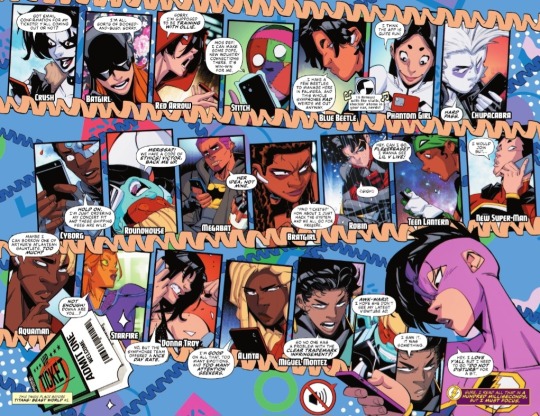
AHHHH THE TITANS ALL GOING TO A CONCERT I LOVE THEM even though the concert is absolutely evil and will probably be where the finale happens
From Speed Force #3 by Jarrett Williams, art by Daniele Di Nicuolo, Francesco Mortarino, George Kambadais, and Tom Derenick
#dcu#dc comics#dc universe#batfamily#batman#robin#kid flash#roundhouse#cyborg#starfire#donna troy#damian wayne#crush#barbara gordon#WHERE ARE DICK AND GAR THOUGH#also more evidence for my ongoing Starfire/Donna Troy canon theory...#op robin#batgirl#flash#aquaman#blue beetle#superman#red arrow#stitch#phantom girl#teen lantern#chupacabra#bratgirl#megabat
95 notes
·
View notes
Text
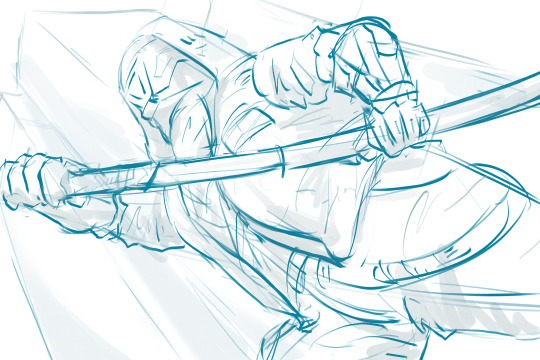
uh
#what#wait why is this on my screen#this is not planned what the fuck is this#i never even played this game why do i have complete reference of jack in my files#oh well i guess this is what happens when you don't wanna draw anything in the idea list#ugh freehand perspective supported purely by perspective theory#you gotta pay the price when you just never wanna google for pose reference#but if i do that it would be soooooo tiresome#uuugggghhhhh#what the hell am i talking about#anyway here have a beep boop cyborg ninja#ghostrunner#ghostrunner jack#my art
24 notes
·
View notes
Text
Recentely there has been a wide speculation on weather or not one of the Strawhats will die at the end of the final saga. Persona I'm a team Shanks-will-die-and-Oda-won't-emotionally-damage-us-further but many people believe that either Usopp or a member of the monster trio will die.
So here I bring my own spin to the theory: no one dies, but Zoro, Sanji, Luffy and Usopp lose/sacrifice their limbs in some way.
Firstly: Zoro loses his other eye, and becomes fully blind.
This could have been foreshadowed by his having already lost one eye, and also his awful sense at direction because he can't see his way. But story wise, if he lost it before duellying Mihawk he will be the strongest swordsman in the world as a disabled person. This ties in with the themes of "strengh isn't defied by your body but your skill" in his backstory about Kuina. Plus the only other blind character in One Piece is a swordsman.
Next, Sanji loses his leg by carbonising it.
Sanji has many paralles with his father Zeff, from similar epithets, morals, same dreams and skills. So since Zeff livedup to his name as "redleg" by cutting off his leg in a gruesome and bloody manner, "blackleg" Sanji will burn his. He already sets his leg on fire in cannon with his powers, so maybe this will also get rid of his Germa modifications and allow him to live as a human.
Most likely, Luffy loses one or both of his arms.
This is something I have seen a few people discuss. Of course, it would parallel Shanks. But you also have Luffy in Impel Down saying he doesn't care about losing both of his arms if it means saving who he loves and trying to rip them off in Whole Cake Island to save Sanji. Luffy does have a pretty long history of selfharm related sacrifice, this would line up with his character.
And finally, Usopp loses all fpur limbs and gets robotic enanchments.
This is definetly the most brutal one, but hear me out: Usopp honestly has so, so many parallels with Franky. From both being inventors, to being addandoned by a biological parent, having been outcasts as kids, having a pet frog, and similar themes of selfloathing/selfblaming. Post timeskip Franky is also a quadruple amputee. So Usopp may eventualy prove himself as a brave warrior of the sea by committing an action that will leave his body severely damaged, forcing him to amputate his limbs. Of course, Franky will make sure to give him the new body he deserves which will allow him to go on with his life.
#one piece#one piece theory#theory theory no mi#monkey d. luffy#roronoa zoro#black leg sanji#god usopp#red haired shanks#dracule mihawk#shimotsuki kuina#red leg zeff#cyborg franky#tw amputation
47 notes
·
View notes
Text
R/n, about the Ultra brothers: It’s sweet that you care so much about them.
Zoffy: I do. And I wouldn't be able to forgive myself if something happened to them, and I wasn't at their bedside to say "I told you so".
#S: big bang theory#ultraman incorrect quotes#tokusatsu incorrect quotes#tokusatsu#ultraman#ultra series#ultraman zoffy#cyborg! reader#ultraman zoffy x reader#afab reader#ultra brothers
14 notes
·
View notes
Text

The Cryptid Conspiracy OC
Anyway inspired character like Inside Job (like reptilian reference), Gravity Falls (Like Bill Cipher), and sanrio (like little twin star)
(And yeah, I was watch David Icke presentation on YouTube)
#cindy the cat pink#cindy the cat pink art#oc#original character#conspiracy theories#conspiracies#cryptid#creature#reptilian#david icke#alien#alien oc#twin#illuminati#cyborg#object oc#object head#mythology#cryptid oc
5 notes
·
View notes
Text
Hey. You guys ever think about Franky not knowing anybody's names at Thriller Bark?
#one piece#thriller bark#cyborg franky#I'm having thoughts#i have theories#I'm pretty sure the only ones he calls by name are chopper and robin
13 notes
·
View notes
Text
so. song machine was. a big step in murdocs redemption arc. specifically in the music videos for desole and the lost chord.
i interpret the desole music video as everybody else being to move on and heal, while murdoc cannot. murdoc watches as 2d leaves in the beginning, and he could go if he wanted to, but he cant. he doesnt feel as if he *can* go anywhere nice with them, because he knows he doesn’t deserve it. ‘everybody else is moving on’ (murdoc helps write the songs, if i recall) is proof of this. but even while everyone seems happy because hes not there, they know theres a piece missing, hence noodles green gloves. part of me thinks that maybe murdoc specifically chose french because he didn’t want people to know the english lyrics. even the trunk is symbolism. murdoc is finally trying to come out of his shell (or. trunk so to speak), only to go back to it at the end of the video.
and the lost chord. they are taken back to the most traumatizing part of their career, plastic beach. as SOON as he realizes where they are, he closes his eyes, he doesnt want to believe they’re actually there. even the trauma is shown through what they see immediately as theyre transported there. murdoc is wearing the boogieman mask, 2d threw up a whale (similar to the one that was constantly watching him), russel was gigantic, granted only for a few seconds, and noodle sees her old mask. the island being destroyed could symbolize them finally moving on (and the fact they could leave), but murdoc being trapped represents the fact that he *cant*. hes trapped by the guilt. but then 2D saves him, almost like a reassurance. “I forgive you.” and its only then that murdoc can finally move on.
#gorillaz#gorillaz band#gorillaz fandom#gorillaz phase 6#gorillaz theory#gorillaz the lost chord#gorillaz desole#gorillaz song machine#desole#the lost chord#gorillaz russel#russel gorillaz#russel hobbs#cyborg noodle#gorillaz noodle#noodle gorillaz#2d gorillaz#2d stuart pot#stuart harold pot#murdoc#murdoc gorillaz#murdoc niccals#theory#fan theory
11 notes
·
View notes